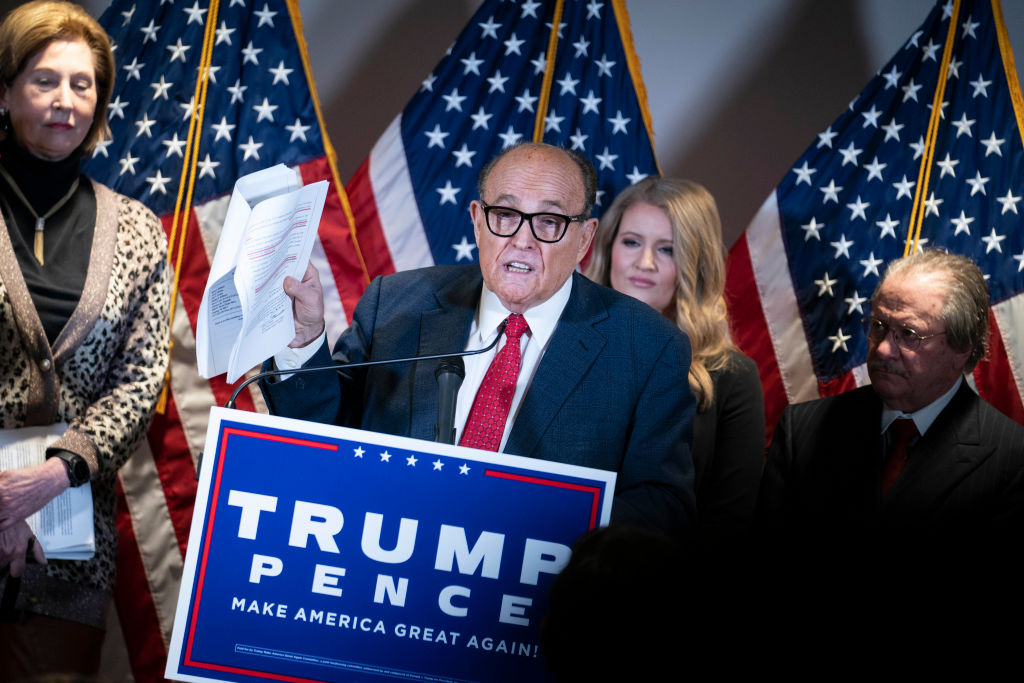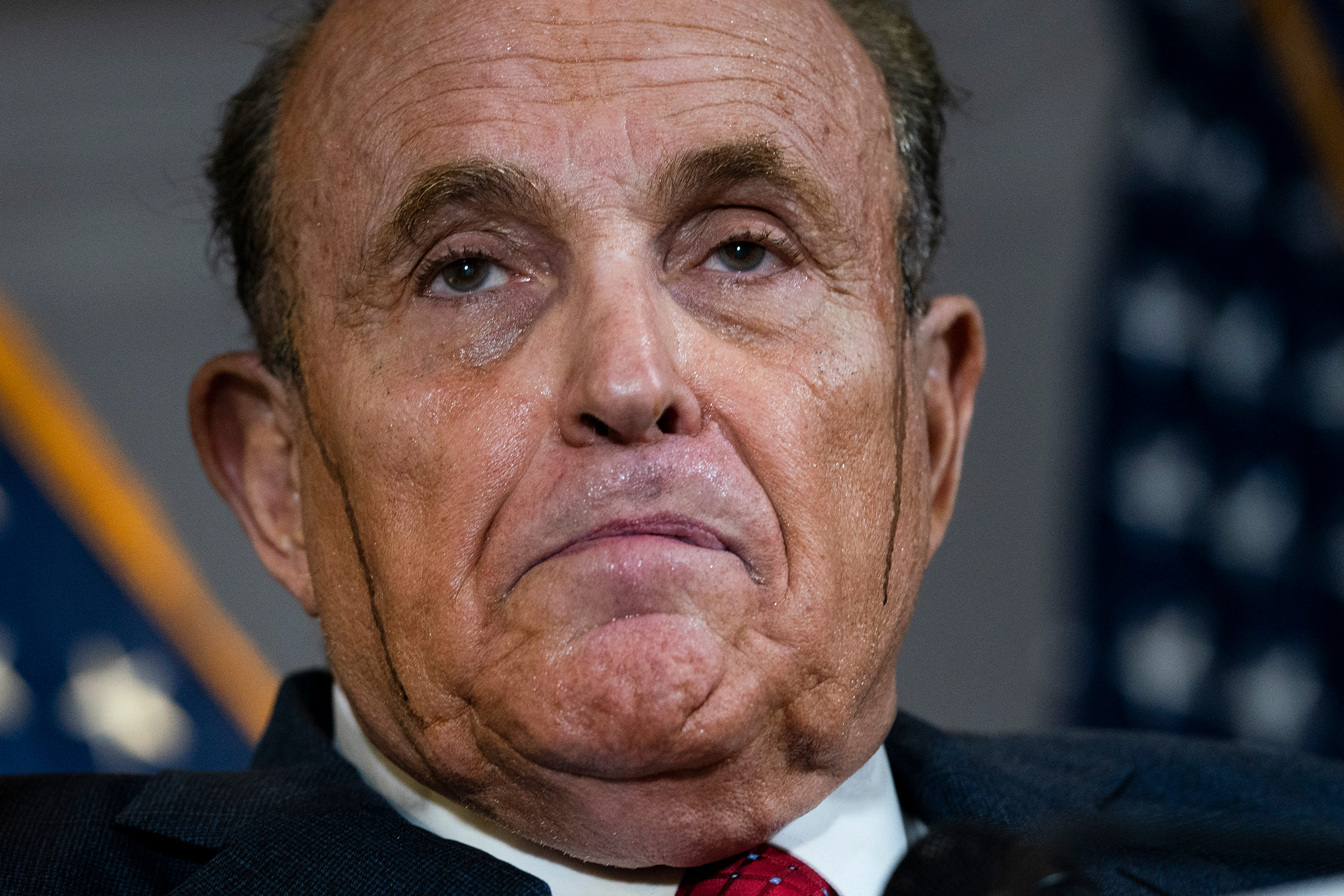
Nearly two weeks after the election was called for President-elect Joe Biden, Donald Trump and his legal team continue to advance spurious and dangerous claims that the election was “rigged.” In a press conference on Nov. 19, Trump’s personal attorney Rudy Giuliani called the election a “massive fraud,” while an attorney for the Trump campaign, Sidney Powell, alleged without evidence a wide-ranging scheme perpetrated by “massive influence of communist money.” She also appeared to suggest a revolution, comparing this moment to “the 1775 of our generation and beyond.”
But Trump and his allies’ public allegations stand in stark contrast to what his lawyers are actually claiming— bound by professional ethics rules—in election-related cases in court. In three separate lawsuits in Pennsylvania and cases in Arizona and Nevada, Trump’s lawyers have jettisoned sweeping claims of fraud, instead focusing on relatively small-bore complaints.
Here’s a look at some prominent instances in which Trump’s lawyers have conspicuously refused to embrace the language of “fraud” while standing before judges, quietly undercutting the President and his allies’ increasingly histrionic public stance.

Pennsylvania
In a recent Pennsylvania federal case, Giuliani alleged “widespread, nationwide voter fraud” in his opening remarks. But under questioning from the judge, he retreated. “This is not a fraud case,” Giuliani later admitted. In the same case, Trump lawyer Linda Kearns said explicitly that she is “not proceeding” on allegations of fraud.
In a separate state case in Montgomery County, Pa., a judge asked Trump lawyer Jonathan S. Goldstein whether he was alleging fraud. “Your honor, accusing people of fraud is a pretty big step,” Goldstein said. “And it is rare that I call somebody a liar, and I am not calling the Board of the [Democratic National Committee] or anybody else involved in this a liar. Everybody is coming to this with good faith.” The judge pressed Goldstein to answer the specific question: “Are you claiming that there is any fraud in connection with these 592 disputed ballots?” To which Goldstein replied: “To my knowledge at present, no.”
In yet another state case in Bucks County, Pa., Trump’s attorneys signed a joint stipulation of facts that explicitly admits that they are not alleging fraud, despite the President and his lawyers’ repeated public claims, according to Marc Elias, a lawyer working for Democrats on election-related cases. The stipulation of facts reads in part: “Petitioners do not allege, and there is no evidence of, any fraud in connection with the challenged ballots.” The stipulation also says they don’t allege or have evidence of “misconduct” or “impropriety” in connection with the challenged ballots.
On Thursday, a judge rejected the Trump campaign’s attempt to throw out absentee ballots in the Bucks County case, noting, “The parties specifically stipulated in their comprehensive stipulation of facts that there exists no evidence of any fraud, misconduct, or any impropriety with respect to the challenged ballots. There is nothing in the record and nothing alleged that would lead to the conclusion that any of the challenged ballots were submitted by someone not qualified or entitled to vote in this election.”
Arizona
In a state case concerning votes in Maricopa County, Ariz., Trump lawyers again dodged and weaved. On Nov. 12, the same day that the President himself was tweeting about hundreds of thousands of votes being stolen from him, a Trump campaign attorney Kory Langhofer told a judge, “We are not alleging fraud in this lawsuit. We are not alleging anyone stealing the election.”
While Trump has repeatedly claimed that glitches in voting machines were evidence of foul play, Langhofer also threw cold water on that idea, saying instead the case concerned “a limited number of cases” of “good-faith errors in operating machines.” The Trump campaign has since dropped this case.
On Thursday, Fox News host Tucker Carlson lambasted Trump campaign lawyer Sidney Powell for claiming without evidence that glitches in electronic voting machines had improperly favored Biden. “She never demonstrated that a single actual vote was moved illegitimately by software from one candidate to another,” Carlson said. “Not one.”
Nevada
Lawyers representing Trump’s campaign sent a letter to Attorney General William Barr on Nov. 5 alleging “criminal voter fraud” in Nevada. But lawyers representing Trump never made that allegation in court filings. Instead, as in many of the other Trump campaign election cases, the Nevada filings focus on much smaller claims, including questions about the use of a scanning machine to verify signatures and whether observers had proper access to observe vote counting.
While prominent Republicans have largely remained silent as Trump has tried to subvert the election, the lack of evidence his legal team has presented in court may begin inspiring some to speak out. Two Republican senators both released statements Thursday based on Trump’s failures in court. “Based on what I’ve read in their filings, when Trump campaign lawyers have stood before courts under oath, they have repeatedly refused to actually allege grand fraud — because there are legal consequences for lying to judges,” Nebraska Sen. Ben Sasse said in part.
“Having failed to make even a plausible case of widespread fraud or conspiracy before any court of law, the President has now resorted to overt pressure on state and local officials to subvert the will of the people and overturn the election,” Utah Sen. Mitt Romney tweeted. “It is difficult to imagine a worse, more undemocratic action by a sitting American President.”
More Must-Reads from TIME
- Cybersecurity Experts Are Sounding the Alarm on DOGE
- Meet the 2025 Women of the Year
- The Harsh Truth About Disability Inclusion
- Why Do More Young Adults Have Cancer?
- Colman Domingo Leads With Radical Love
- How to Get Better at Doing Things Alone
- Michelle Zauner Stares Down the Darkness
Write to Tessa Berenson Rogers at tessa.Rogers@time.com